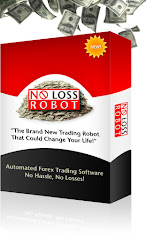In principle, automated trading is great. Simply install a Robot - or Expert Advisor as it is commonly called - activate the settings, and wait for the cash to flow in.
That's the explicit promise made by pretty much every Robot vendor I've ever come across. But I am a sceptic, and not just by nature but by harsh experience. The idea of forex robots is exciting, but the reality is that they typically work only half the time. And the half when they don't work is where you will sit back in horror and watch your trading capital disappear before your eyes.
Why should this be? Simple. Forex Robots - like all software products - are designed using key criteria and assumptions. In this case, those criteria and assumptions relate to the programmer's understanding of how the forex market works. As a result, forex robots tend to be written to work only when the market is moving in a certain way.
The problem is that that Mr Market is a bit of an unpredictable swine. As seasoned traders have always discovered to their cost, the market just doesn't do what's expected of it - at least, not with any consistency that you should be willing to bet your house on. So when the market changes, the robot will often start to lose on the trades and you run the very real risk of being bumped out of the game.
So there are robots that work well when the market is in a channel, others that offer stellar performance in a market that's trending, and others that come into their own when the market breaks quickly to the upside or the downside. The problem is that I have yet to find one robot capable of adapting to these different scenarios - and that really raises a question about whether you should ever rely on a fully automated trading system. I would suggest not.
Which isn't to say that I don't use robots. I do - and with some success. But that's only because I tend to use those robots that require some input and judgement from the user. As I've said elsewhere, the real secret of forex robots is in the settings: how you configure them, tweak them and selectively override them will ultimately determine how much money they make you. Or lose you.
And there, dear Reader, is the real issue. In order to make those judgements, you need some understanding of forex trading and, yes, the courage to make your own assumptions based on practical engagement with the trading process. Trading isn't about pushing a button and waiting for results. It's about thinking for yourself, learning from your mistakes and developing strategies that fit your trading style and your appetite for risk. A forex robot such a FabTurbo can make a huge difference to your success - but only if you are prepared to be its master rather than its slave.


Excellent information Shaun
ReplyDelete